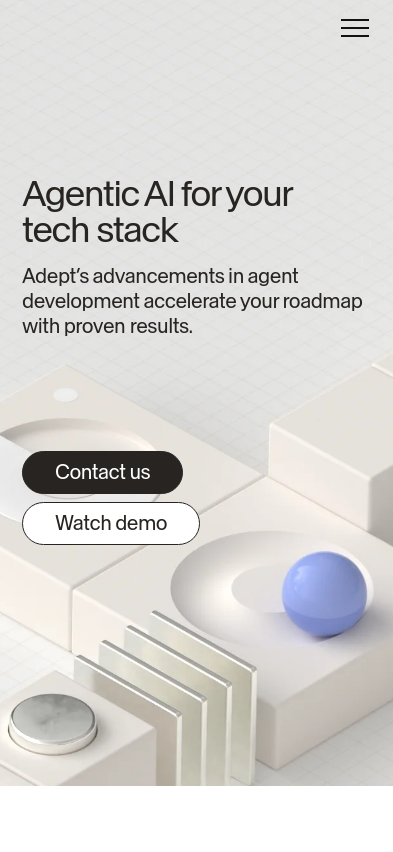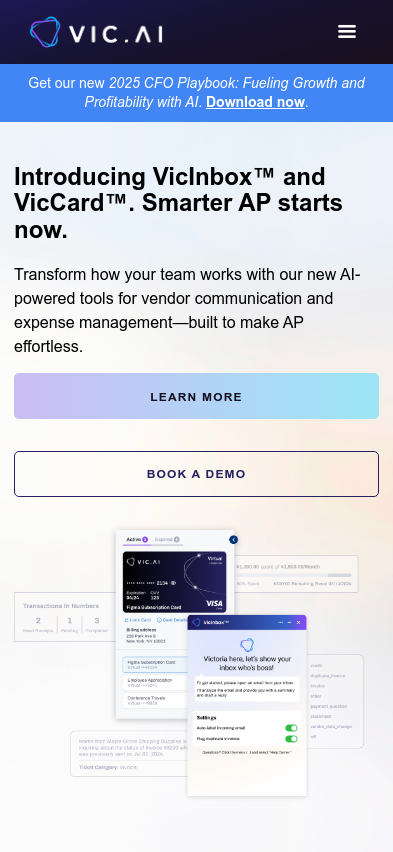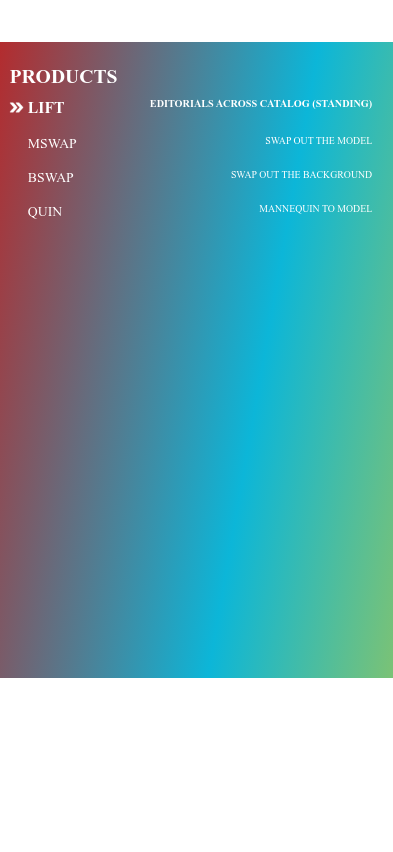⚡ZurzAI.com⚡
Companies Similar to Zapata Computing
Xanadu

Xanadu is an enterprise technology company specializing in photonic quantum computing solutions, aiming to bring advancements in computational capabilities.
Xanadu is focused on advancing quantum computing technology, with an emphasis on building and deploying photonic quantum computers. Their approach aims to push the bounds of computation by leveraging the properties of light, which can offer scalability and efficiency advantages over traditional quantum computing methods.
Their unique value proposition lies in their pioneering use of photonics for quantum computing. This technology utilizes photons to process information at quantum scales, which potentially allows for faster computations and reduced power consumption compared to other quantum computing methods. This differentiation is intended to provide them with a strategic advantage in developing scalable, practical quantum solutions suitable for a variety of complex computational problems.
Xanadu delivers on their value proposition through several key initiatives:
-
Photonics Platform: By focusing on photonics, they aim to overcome some limitations associated with other quantum computing techniques, such as the need for extremely low temperatures and complex cooling systems. Their photonics-based approach offers a theoretically more manageable pathway to scalable quantum computation.
-
PennyLane Software: They provide a software library, PennyLane, which integrates quantum hardware with machine learning platforms. The integration aims to facilitate practicality and accessibility, enabling researchers and developers to create advanced quantum algorithms and applications efficiently.
-
Open-Source Commitment: Xanadu’s commitment to open-source development allows broader community engagement, potentially accelerating innovation and adoption of their technology. This inclusive approach also seeks to catalyze improvements by leveraging collective expertise and fostering collaboration across the quantum computing landscape.
-
Research and Development: Continuous research efforts focus on expanding the capabilities and applications of their photonic quantum computing technology. By investing in cutting-edge R&D, Xanadu strives to remain at the forefront of technological advancements in quantum computing.
Overall, Xanadu’s strategic emphasis on photonic quantum computing, combined with their commitment to software development, collaborative innovation, and a scalable computational platform, defines their approach to delivering value in the quantum computing sector.
IonQ

IonQ is a developer of quantum computing for commercial applications.
IonQ Inc. specializes in the development and production of quantum computing systems primarily focused on leveraging trapped ion technology. The company emphasizes its expertise in building quantum processors that capitalize on atomic ions to provide high-performance and naturally quantum computing capabilities.
Key Focus Area: IonQ concentrates on quantum computing systems and their applications. The organization’s portfolio ranges from early quantum computers like Harmony to advanced machines such as Aria and Forte, with an expectation to introduce a more capable system, Tempo, by 2025. These systems boast varied capacities in terms of algorithmic qubits—a metric indicating the actual functional qubits within a quantum computer, which measures their effectiveness in executing quantum algorithms.
Unique Value Proposition and Strategic Advantage:
- Algorithmic Qubits (#AQ): IonQ differentiates itself through its benchmark system known as Algorithmic Qubits, which aggregates performance across key quantum algorithms. The company highlights its strong pursuit of practical quantum computing benchmarks that prioritize real-world utility and can be directly applied to significant industry challenges, such as optimization and machine learning.
- Trapped Ion Technology: The company advocates for trapped ion technology, asserting benefits like the highest gate fidelity, all-to-all connectivity between qubits, and long coherence times among quantum technologies. This strategic focus on trapped ion technology allows IonQ to claim a lower error rate and higher system stability, which purportedly requires fewer qubits for error correction.
Delivery on Their Value Proposition:
- Product Range: IonQ provides a suite of quantum systems tailored for different performance levels and environments. Products like Aria and Forte offer accessibility and high performance, while Forte Enterprise caters to on-premise, hybrid workflows.
- Cloud Integration: The IonQ Quantum Cloud facilitates usage of their quantum systems via the cloud, allowing broad accessibility for development and deployment of quantum applications. This simplification of integration with major cloud services is central to delivering practical quantum computing solutions to businesses.
- Consulting Services: Supporting businesses in their "quantum journey" through consulting services is integral to IonQ's approach. The company offers personalized partnerships to help corporations identify and develop quantum applications that can potentially provide advantages over classical computational approaches.
- Industry Applications: IonQ’s systems are positioned to address various industry challenges, including drug discovery, direct carbon sequestration, and improved battery materials. They emphasize real-world applications in finance, supply chain, and pharmaceutical research, among others, promoting the utility of quantum computing in solving complex business problems.
Overall, IonQ positions itself as a quantum computing innovator focusing on practical applications and the advancement of trapped ion technology, aiming to shape the future of computing by making quantum technology more accessible and effective for solving business challenges.
Rigetti Computing
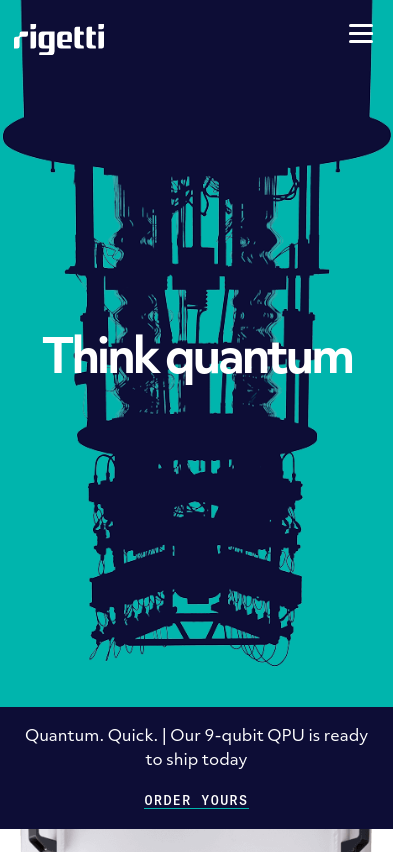
Rigetti Computing is a full-stack quantum computing company that designs and manufactures superconducting quantum integrated circuits, packages and deploys those chips in a low temperature environment, and builds control systems to perform quantum logic operations on them.
Company Overview: Rigetti Computing
1) Key Focus Area
Rigetti Computing is focused on the development and deployment of quantum computing technologies. The company aims to build scalable quantum systems that integrate seamlessly into existing computational infrastructures to solve complex problems across various industries. Their system is designed to work as a specialized co-processor alongside classical computing resources, providing enhanced computational capabilities.
2) Unique Value Proposition and Strategic Advantage
Rigetti offers a full-stack approach to quantum computing, which includes the design, manufacturing, and delivery of quantum computers and their integration into hybrid quantum-classical computing environments. A key component of their strategy is the proprietary Quantum Cloud Services (QCS) platform, which allows users to access Rigetti's quantum processors over the cloud, providing low-latency connectivity and usability akin to traditional co-processors.
The strategic advantage of Rigetti lies in the integration of their hardware and software capabilities. By owning and operating the full stack—from chip design and manufacturing through cloud delivery—they position themselves as a company with control over the entire quantum computing pipeline, potentially reducing risk and enhancing the development speed of their quantum technologies.
3) Delivery on Their Value Proposition
-
Hardware Engineering and Fabrication: Rigetti's technology stack begins with the fabrication of quantum processor chips. Their facility, Fab-1, combines advanced semiconductor technologies with novel machining methods to produce cutting-edge superconducting qubits, critical for quantum computation.
-
Quantum Cloud Services (QCS): This platform facilitates the integration of Rigetti quantum computers in the cloud, providing a hybrid environment for executing quantum programs. By designing QCS to offer ultra-low latency connectivity, Rigetti enhances the performance and practicality of quantum applications for industries looking to leverage these technologies.
-
Research and Development: Rigetti continues to innovate through dedicated research in areas like quantum error correction, algorithm development, and optimization techniques. Their investments in these fields aim to improve operational efficiencies and connectivity between qubits, ultimately increasing the application scope of their quantum processors in real-world scenarios.
-
Software Ecosystem: Rigetti supports a robust ecosystem of software tools that enable users to write and run quantum programs. Key offerings include the Quil SDK, an instruction language, and various simulation and development tools, fostering ease of use and broad adoption across user levels.
-
Collaborations and Partnerships: The company engages with various industry partners to foster innovation and application development, such as collaboration with software platforms like Azure Quantum and Amazon Braket, thus expanding their reach and applicability.
In summary, Rigetti Computing emphasizes a full-stack solution to quantum computing, integrating their hardware, software, and cloud capabilities to deliver advanced computational solutions suited for complex industry use cases, thus maintaining a competitive advantage in the evolving quantum landscape.
Quantum Machines

Quantum Machines is developing operation and control systems for quantum computers - hardware and software that allow to realize the potential of quantum computing.
Key Focus Area
Quantum Machines' primary focus lies in the domain of quantum control engineering, specifically delivering sophisticated solutions for running, optimizing, and scaling quantum computers. Their technologies cater to a broad range of qubit types, including superconducting, optically addressable, and neutral atoms, and pursue applications from basic research to large-scale quantum computing and high-performance computing (HPC).
Unique Value Proposition and Strategic Advantage
Quantum Machines' unique value proposition centers on their state-of-the-art Quantum Orchestration Platform (QOP) and associated products such as OPX1000, OPX+, and QUA, a pulse-level programming language. Their strategic advantage is built upon the integration of cutting-edge hardware capable of real-time processing, ultra-fast feedback and a robust software suite that facilitates seamless programming of quantum algorithms.
Key elements include:
-
Unified System: Their all-in-one quantum control system integrates advanced digital synthesis and an adaptive architecture capable of managing complex quantum computational tasks without the typical low-level FPGA programming.
-
Scalability: Their products are designed for scalability, allowing researchers to upgrade their systems as needed without major reconfigurations or redesigns, which is crucial for both academic institutions and commercial ventures pushing the limits of quantum hardware.
-
Intuitive Programming: The use of QUA enables researchers to write code that resembles pseudo-code, significantly simplifying the complexity associated with developing and testing quantum algorithms.
Delivery on Value Proposition
Quantum Machines delivers its value proposition through a combination of innovative hardware and software solutions that reduce time-to-experiment and are adaptable to various quantum research needs:
-
OPX and OPX+ Controllers: These controllers are designed to handle complex real-time quantum tasks, offering agile and flexible processing. They allow for quick deployment of complex sequences and drastically reduce coding complexity and experimental turnaround time.
-
Pulse Processing Technology: Their Pulse Processing Unit (PPU) technology facilitates classical and quantum processing in real-time, supporting a broad array of advanced quantum algorithms and protocols efficiently.
-
Modular Hardware Systems: Products such as the OPX1000 and Octave provide a modular approach, making it easier to scale systems and integrate various components and instruments tailored to specific experimental needs.
-
Comprehensive Support and Integration: Quantum Machines emphasizes extensive customer support, aiding users in troubleshooting and optimizing custom setups. Moreover, their hardware demonstrates high compatibility, seamlessly integrating with existing laboratory setups and scaling up as necessary.
-
Educational and Resource Support: Quantum Machines offers support materials including tutorials, case studies, and a dedicated customer success team to assist and educate users in maximizing the potential of their systems.
In summary, Quantum Machines seeks to streamline quantum computing processes by providing sophisticated yet user-friendly hardware and software solutions, focused on reducing complexity, time to result, and enhancing the scalability of quantum research infrastructures. They aim to support researchers and industry leaders in pushing technological boundaries and advancing practical applications of quantum computing.
Pasqal

PASQAL provides quantum processors for use in complex computing challenges.
Pasqal is focused on quantum computing, aiming to develop and deliver practical quantum solutions for various industries. They emphasize the usage of neutral-atom technology to address real-world challenges across an array of sectors such as aerospace, defense, banking, finance, energy, utilities, public sector, manufacturing, materials science, pharma, healthcare, transportation, and mobility.
Key Focus Area:
- Quantum Computing: Pasqal leverages neutral-atom technology to revolutionize computing processes, enabling precise simulations, complex data analysis, and optimization of intricate systems across various industries.
Unique Value Proposition and Strategic Advantage:
- Nobel Prize-winning Technology: By integrating groundbreaking research, including contributions from a Nobel Laureate, Pasqal has developed leading-edge quantum computing technology.
- Full-Stack Approach: Their comprehensive ecosystem covers all aspects of quantum computing, from hardware production and software solutions to strategic collaboration with industry giants. This complete approach aims to streamline the customer’s journey from concept to implementation.
How They Deliver on Their Value Proposition:
- Multi-Industry Solutions: Pasqal tailors its solutions to a broad range of industries, addressing specific industry challenges such as optimizing traffic flow in transportation or enhancing drug discovery in healthcare.
- Strategic Partnerships: By forming alliances with major corporations like BMW, EDF (a notable energy player), and Crédit Agricole CIB (a financial institution), Pasqal demonstrates its technology’s applicability and value in real-world scenarios.
- Technological Roadmap: Pasqal’s forward-looking roadmap outlines their goals to scale quantum technology, increasing the number of qubits and improving system architecture to expand computing capabilities further.
- Educational and Community Engagement: Through the Quantum Quest educational platform and active community involvement, Pasqal promotes learning and innovation within quantum computing, encouraging industry-wide advancement.
- Proprietary Tools: Pasqal offers advanced software tools, such as Pulser Studio and Pulser Library, tailored for neutral atom quantum computing, reinforcing their technology's adaptability and scalability.
Overall, Pasqal positions itself as a quantum computing innovator with competencies tailored to meet the complex demands of diverse industries through its proprietary technology and strategic industry partnerships, effectively leveraging its technological and collaborative strengths to deliver significant computational advancements.
Horizon Quantum
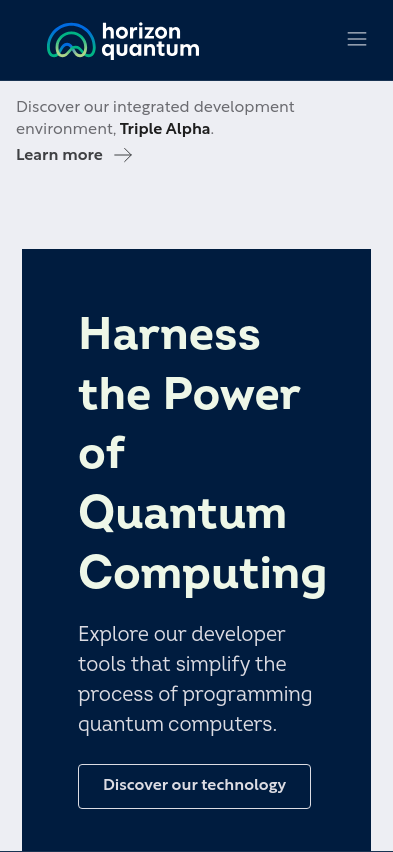
Horizon Quantum is building new tools for quantum computers software development.
Horizon Quantum Computing Overview
1) Key Focus Area: Horizon Quantum Computing is dedicated to advancing quantum software development tools. Its primary focus is simplifying the programming of quantum computers to make them as accessible and functional as traditional computing systems. Understanding that quantum computing has the potential for significant societal impact, Horizon aims to address the challenges faced by the current quantum computing landscape, such as the application bottleneck and talent pool limitations.
2) Unique Value Proposition and Strategic Advantage: Horizon distinguishes itself by offering a unique value proposition through its integrated development environment (IDE) called Triple Alpha. Three main facets define its strategic advantage:
- Automatic Code Transformation: Horizon's tools transform conventional programming code into quantum algorithms, enabling non-experts to leverage quantum computing without needing intricate knowledge of quantum mechanics.
- Modular and Hardware-agnostic System: Horizon advocates for a modular, multi-vendor approach that provides flexibility and the ability for its software to integrate seamlessly with various quantum hardware. This adaptability enhances its appeal for diverse applications and industries.
- Proprietary Software-Hardware Integration: With the establishment of a quantum computing testbed, Horizon can integrate its software with its hardware, pushing the limits of interoperability and control, an approach that is relatively unique in this domain.
3) Delivery on the Value Proposition: Horizon realizes its philosophy through a combination of innovative approaches and strategic partnerships:
-
Triple Alpha IDE: This web-based environment simplifies quantum programming by allowing developers to write, compile, and deploy code on quantum computers. It supports multiple levels of abstraction, includes Turing-complete languages, and integrates subroutines from established languages like C/C++, making it versatile and user-friendly.
-
Algorithm Synthesis: The core capability of automatically generating quantum algorithms from classical code helps bridge the gap between current computational capabilities and potential quantum advantages.
-
Integrated Hardware Testbed: Located in Singapore, Horizon's hardware testbed allows for effective integration and testing of its software systems with multiple quantum computing configurations. This setup ensures that Horizon can directly test and refine its technologies in a real-world environment, enhancing their robustness and wide applicability.
-
Collaborative Ecosystem: By engaging with other quantum technology pioneers and industry leaders, such as Rigetti Computing and Quantum Machines, Horizon aligns itself strategically to ensure its technology remains cutting-edge and its applications remain broad.
In sum, Horizon Quantum Computing leverages its comprehensive suite of development tools and strategic hardware integration to democratize access to quantum computing technology, making it a feasible and practical tool in various computational realms.
Super.tech
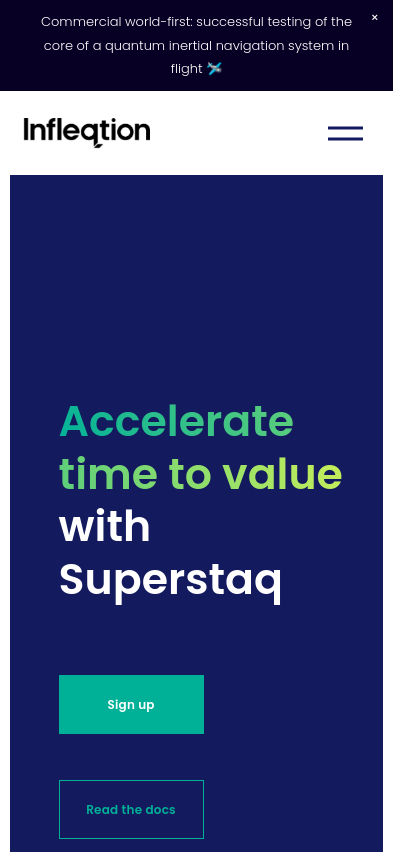
Super.tech develops software that speeds up quantum computing by bridging the gap between applications and hardware.
Key Focus Area:
Super.tech, operating as part of Infleqtion, concentrates on creating quantum computing solutions. Their primary offering is Superstaq, a quantum software platform engineered to leverage optimization techniques across multiple layers of computation to enhance performance.
Unique Value Proposition and Strategic Advantage:
-
Performance Optimization: Superstaq claims to offer substantial performance improvements (up to 10 times more efficient) through cross-layer optimization. This involves advanced techniques such as Dynamical Decoupling which mitigates errors and optimized decomposition methods that fully exploit the native operations of quantum hardware.
-
Universal Accessibility: The platform is designed to support leading quantum computing frameworks like Cirq and Qiskit, enabling users to write programs that can operate across a variety of quantum computing devices — including those produced by IBM, IonQ, and Rigetti — without additional effort. This flexibility is significant in an evolving landscape where hardware compatibility can become a hurdle.
Delivery on Value Proposition:
-
Technical Sophistication: The platform incorporates state-of-the-art methods such as low-level, device-specific optimizations that account for factors like architecture, connectivity, and noise levels. This kind of sophisticated optimization allows it to run more effective quantum algorithms, as demonstrated in the example of enhancing a 4-qubit Bernstein-Vazirani circuit.
-
Developer Resources and Support: Super.tech provides robust resources for developers, including plugins for well-known quantum languages such as Qiskit and Cirq, and access to their OpenAPI. Such resources ensure that developers can easily integrate and leverage the platform for their quantum computing projects.
-
Collaborations and Case Studies: The company emphasizes collaborations with entities like Morningstar and shows practical applications through case studies. These collaborations often focus on specific tasks, such as optimizing the Toffoli gate, reducing algorithm infidelity, or engaging in educational initiatives like the QSCOUT onboarding program, thus highlighting the platform's versatility and applicability in real-world scenarios.
In summary, Super.tech aims to solve the complexities and inefficiencies associated with quantum computing through a software-driven approach, facilitating user access and application development across a diverse range of quantum devices. The company's emphasis on performance gains and compatibility attempts to position its solutions as strategic assets for entities looking to push the boundaries of what quantum computing can achieve in practical applications.
Zapier Central
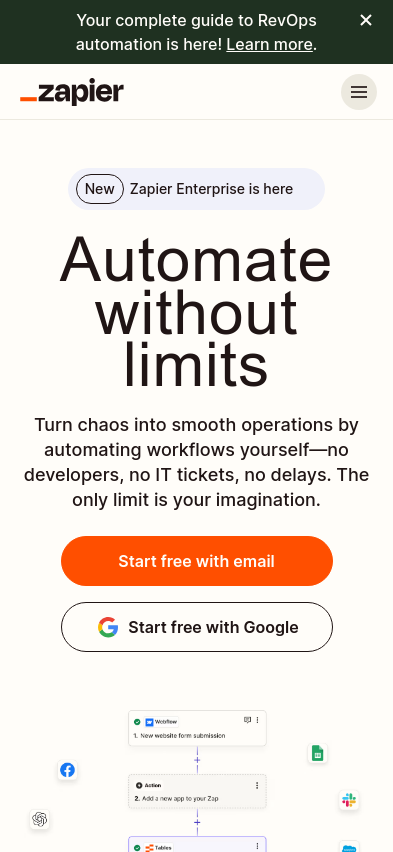
No summary available.
Zapier is a company focused on providing automation solutions that empower users to integrate various applications and automate workflows without the need for coding. Its primary focus is equipping businesses with the tools necessary to streamline their operations, from marketing and sales to customer support and IT management.
Key Focus Area: Zapier's main focus is on enabling users to create custom automated workflows across over 7,000 cloud-based apps. It targets companies seeking to optimize tasks across numerous sectors including marketing campaigns, data management, IT support, sales, and customer service.
Unique Value Proposition and Strategic Advantage: Zapier offers a no-code platform that makes it possible for businesses of all sizes to automate complex workflows. The platform allows users to connect their existing tech stack applications seamlessly, removing the need for extensive IT support or development resources. This capability gives clients a strategic advantage by lowering operational costs and accelerating process efficiencies.
How They Deliver on Their Value Proposition:
- Automation Tools: Zapier provides a range of automation tools, including 'Zaps,' which are step-by-step automation setups that connect two or more apps to automate repetitive tasks.
- Highly Integrative Platform: With integrations spanning over 7,000 apps, Zapier ensures compatibility with widely-used platforms like Google Sheets, Slack, Facebook Lead Ads, Salesforce, etc., making it an adaptable choice for businesses with varied technological environments.
- AI Integration: The platform enhances its automation capabilities through AI-powered tools. These tools facilitate intelligent workflows, enabling tasks such as lead qualification and customer support ticket resolution using AI models like OpenAI.
- Customization and Scalability: Users can leverage features like Paths for branching logic and Filters for selectively triggering workflows, ensuring automation adheres to specific business rules. Zapier’s scalable infrastructure supports business expansion without the typical IT bottlenecks.
- Secure and Compliant Environment: To protect user data, Zapier is SOC 2 compliant, supporting functions such as identity and access management, thus ensuring data security while enabling efficient team collaboration.
Through these offerings, Zapier helps businesses increase productivity by automating routine workflows, thereby reducing errors, man-hours, and IT dependency while increasing speed and accuracy across operations.






